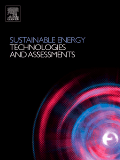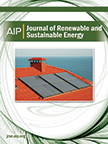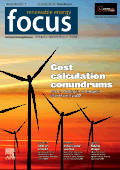
Sustainable Energy Technologies and Assessments
Scope & Guideline
Exploring Breakthroughs in Renewable Technologies
Introduction
Aims and Scopes
- Sustainable Energy Generation Technologies:
Research on various renewable energy generation technologies, including solar, wind, hydro, and biomass, focusing on their efficiency, integration, and environmental impact. - Energy Storage Solutions:
Investigation of energy storage technologies such as batteries, thermal storage, and pumped hydro, emphasizing their role in enhancing the reliability and sustainability of energy systems. - Energy Efficiency Optimization:
Studies aimed at improving energy efficiency across different sectors, including residential, industrial, and transportation, utilizing advanced technologies and methodologies. - Environmental Impact Assessments:
Evaluations of the environmental impacts of energy technologies and systems, including life cycle assessments (LCA) and exergy analysis, to promote sustainable practices. - Smart Grid Technologies:
Exploration of smart grid innovations, including demand response, energy management systems, and integration of distributed energy resources to enhance grid reliability. - Policy and Economic Evaluations:
Analysis of policies and economic frameworks that support the adoption of sustainable energy technologies, including cost-benefit analyses and market assessments.
Trending and Emerging
- Hybrid Energy Systems:
Research on integrated systems that combine multiple energy sources (solar, wind, biomass) for optimized performance and sustainability is gaining traction. - Smart Technologies and IoT Integration:
The incorporation of Internet of Things (IoT) technologies in energy management and optimization is becoming increasingly popular, reflecting the digital transformation of the energy sector. - Energy Policy and Market Dynamics:
There is a growing emphasis on the economic and policy dimensions of energy systems, particularly in relation to sustainability and the transition to low-carbon economies. - Advanced Materials for Energy Applications:
Innovations in materials science, particularly for energy storage and conversion technologies, are emerging as a vital area of research. - Life Cycle and Sustainability Assessments:
Research focusing on comprehensive assessments of energy technologies' life cycles and their sustainability impacts is on the rise, reflecting a holistic approach to energy solutions.
Declining or Waning
- Conventional Energy Sources:
Research focusing on traditional fossil fuel technologies is becoming less prominent as the focus shifts towards renewable energy sources and sustainability. - Basic Renewable Energy Studies:
There is a notable decline in papers that cover foundational or basic research on renewable energy technologies, as the field progresses towards more applied and advanced studies. - Single-Factor Analysis:
Studies that examine energy systems or technologies in isolation, without considering broader systemic impacts or interactions, are less common as integrated approaches gain favor. - Static Energy Models:
The use of static models that do not account for dynamic interactions within energy systems is waning, as researchers increasingly adopt dynamic and adaptive modeling techniques. - Generalized Energy Policy Discussions:
Research that presents broad discussions on energy policy without specific case studies or quantitative assessments is declining in favor of more targeted analyses.
Similar Journals

Advances in Applied Energy
Exploring the Future of Energy Applications.Advances in Applied Energy is an esteemed academic journal published by Elsevier, focusing on the dynamic and interdisciplinary field of energy applications. With its ISSN 2666-7924 and esteemed open access model initiated in 2021, this journal has rapidly emerged as a prominent platform for disseminating cutting-edge energy research, especially noted for its robust ranking as Q1 in Energy (miscellaneous) in 2023. Situated in the vibrant academic landscape of the United Kingdom, it serves as a global hub for thought leaders and innovators, evidenced by its impressive ranking as #3 out of 73 in the Scopus Ranks for General Energy, placing it within the 96th percentile in the field. This journal aims to foster collaboration, innovation, and knowledge transfer between researchers, professionals, and students, ensuring that critical advancements in energy technologies are readily available to a wide audience. Its commitment to high-quality research and accessibility further underscores its importance in shaping the future of sustainable energy solutions.

Journal of Renewable and Sustainable Energy
Transforming Research into Renewable RealityThe Journal of Renewable and Sustainable Energy, published by AIP Publishing, stands at the forefront of research in the fields of renewable energy and sustainable practices. With an ISSN of 1941-7012, this journal aims to foster innovative research and exchange of knowledge on sustainable technologies and methodologies that contribute to environmental conservation and energy efficiency. Achieving a prestigious Q2 ranking in the category of Renewable Energy, Sustainability, and the Environment, it ranks 135 out of 270 journals in Scopus, signifying its impactful contributions to the field. The journal, active from 2010 to 2024, provides a platform for authors, analysts, and practitioners to disseminate significant findings that can shape future environmental policies and energy frameworks. Although not currently an Open Access publication, it remains an essential resource for researchers dedicated to advancing sustainable development and energy solutions.

Energy Storage
Leading the Charge in Energy Storage ResearchEnergy Storage, published by WILEY, is a pivotal journal dedicated to the rapidly evolving field of energy storage technologies. Since its inception in 2019, the journal has established a significant platform for researchers and professionals by providing insightful articles that explore innovations and advancements in energy engineering and renewable energy systems. With an Impact Factor positioning it in the Q3 category for both Energy Engineering and Power Technology and Renewable Energy, Sustainability, and the Environment, Energy Storage plays a crucial role in disseminating knowledge that addresses global energy challenges. The journal is indexed in Scopus, showcasing its commitment to high-quality research, providing valuable contributions to the community including engaging studies and practical applications aimed at sustainable energy solutions. For those passionate about the future of energy, Energy Storage represents an essential resource for staying informed and connected within this dynamic and interdisciplinary field.

Renewable Energy Focus
Exploring Innovative Pathways in Renewable EnergyRenewable Energy Focus is a premier journal published by Elsevier, dedicated to advancing the field of renewable energy and sustainability. With an ISSN of 1755-0084 and an E-ISSN of 1878-0229, this journal serves as a vital platform for researchers, professionals, and students interested in innovative solutions to energy challenges. Established in 2007, the journal has evolved to become a recognized authority in the subject area, currently ranked in the Q2 quartile of its category for 2023, emphasizing its significance in promoting impactful research. The journal encompasses a wide range of topics, including solar, wind, bioenergy, and sustainable practices that contribute to environmental conservation and energy efficiency. As part of Elsevier's commitment to disseminating high-quality research, Renewable Energy Focus is indexed in Scopus, currently holding a rank of #92/270 in the energy sector, positioning it in the 66th percentile of its field. This journal offers an essential resource for those dedicated to fostering sustainable energy solutions.

International Journal of Power and Energy Systems
Elevating Insights in Energy Engineering ExcellenceInternational Journal of Power and Energy Systems, published by ACTA PRESS, serves as a vital platform for research and discourse in the multifaceted fields of applied mathematics, electrical and electronic engineering, and energy engineering. With an ISSN of 1078-3466 and an E-ISSN of 1710-2243, this journal covers a broad spectrum of topics pertinent to power and energy systems, showcasing innovative research from its inception in 1996 through to its projected contributions in 2024. Operating from Calgary, Canada, the journal, though not currently open access, provides invaluable insights into the challenges and advancements within these domains, as reflected in its categorization in the Q4 quartile across multiple indices. Despite being positioned in lower output percentiles in 2023 rankings on Scopus—specifically, #212 in Energy Engineering and Power Technology—it remains a critical resource for scholars seeking to expand the frontiers of knowledge in energy sustainability and system efficiency. Researchers, professionals, and students alike will find the journal’s commitment to fostering academic dialogue and disseminating pioneering results both essential and inspiring.

Journal of Modern Power Systems and Clean Energy
Advancing Innovation in Power Systems and Renewable Energy.Journal of Modern Power Systems and Clean Energy is a leading academic platform dedicated to advancing the fields of energy engineering, power technology, and renewable energy. Published by the prestigious STATE GRID ELECTRIC POWER RESEARCH INSTITUTE in China, this Open Access journal has been a significant contributor to the dialogue on sustainable energy solutions since its inception in 2013. With a Q1 ranking in both the Energy Engineering and Power Technology and Renewable Energy, Sustainability and the Environment categories, it serves a crucial role for researchers and professionals striving to push the boundaries of innovation in power systems and clean energy technologies. The journal’s impact is reflected in its impressive Scopus rankings, placing it in the top 10% of its categories, making it an invaluable resource for academia and industry alike. The Journal of Modern Power Systems and Clean Energy invites submission of original articles, reviews, and case studies that resonate with its mission of promoting sustainability and addressing contemporary energy challenges.

Energy Strategy Reviews
Shaping the future of energy through rigorous research.Energy Strategy Reviews is a premier journal dedicated to the field of energy studies, published by ELSEVIER in the Netherlands. With an ISSN of 2211-467X and an E-ISSN of 2211-4688, this open-access journal has been fostering significant discourse in energy strategies since its inception. Recognized for its scholarly contributions, Energy Strategy Reviews proudly holds a 2023 ranking of Q1 in the Energy (Miscellaneous) category, reflecting its elite status within the scientific community, highlighted by a Scopus rank of 12 out of 78, placing it in the 85th percentile. The journal serves as a vital platform for researchers, professionals, and students alike, addressing pressing energy issues and innovative solutions. Since 2019, it has embraced an open access model, ensuring that its content is widely accessible. As it continues to converge knowledge from various angles of the energy landscape through 2024 and beyond, Energy Strategy Reviews plays a crucial role in advancing sustainable energy practices and policies globally.

Clean Technologies
Leading the Charge in Clean Technology ResearchClean Technologies, published by MDPI in Switzerland, is a pioneering open-access journal that has garnered significant recognition since its inception. Focusing on innovative solutions and practices for sustainability, it aims to serve the interdisciplinary field of clean technology while addressing pressing environmental challenges. With an impressive impact factor evidenced by its Q2 ranking in Environmental Science (miscellaneous) and Q3 in Global and Planetary Change, as well as a Scopus rank of #43 among a competitive pool of journals in these fields, Clean Technologies is positioned as a vital resource for researchers, professionals, and students alike. As a forward-thinking platform with open access since 2018, the journal emphasizes the dissemination of high-quality research, fostering collaboration and innovation in the quest for sustainable development. Located at ST ALBAN-ANLAGE 66, CH-4052 BASEL, SWITZERLAND, it also provides a comprehensive digital archive that allows for easy access to cutting-edge studies and findings relevant to global sustainability efforts.

Energy Science & Engineering
Fostering Dialogue on Energy Solutions and Safety StandardsEnergy Science & Engineering, published by WILEY, serves as a leading open-access platform for the dissemination of high-quality research and insights in the fields of energy science, engineering, and safety. Since its inception in 2013, this esteemed journal has gained recognition for its impactful contributions, reflected in its impressive impact factor and notable Scopus rankings. As of 2023, it holds a distinguished Q2 category ranking in both Energy (miscellaneous) and Safety, Risk, Reliability, and Quality, showcasing its vital role in advancing interdisciplinary collaboration and innovation. With an open access model, the journal ensures that groundbreaking research reaches a wide audience, fostering discussion and knowledge sharing across academia and industry. The scope of the journal encompasses cutting-edge topics related to energy efficiency, renewable energy technologies, and risk management, making it an essential resource for researchers, professionals, and students aiming to contribute to the evolving landscape of energy science and enhance societal sustainability.

Global Energy Interconnection-China
Driving the Future of Energy with Cutting-edge ResearchGlobal Energy Interconnection-China is an esteemed Open Access journal published by KEAI PUBLISHING LTD that focuses on the rapidly evolving fields of energy engineering and power technology. Since its launch in 2018, the journal has become a vital resource for researchers and professionals interested in sustainable energy solutions and innovative technologies, addressing the critical challenges facing the global energy landscape. With an impressive Q2 categorization in multiple engineering and energy-related disciplines, the journal ranks highly in Scopus, positioning itself as a leading platform for disseminating impactful research. Specifically, it excels in Automotive Engineering and Control and Systems Engineering, as evidenced by its competitive standing within the top quantiles of its fields. By leveraging its open access model, Global Energy Interconnection-China ensures that high-quality research is accessible to a worldwide audience, fostering collaboration and advancements in renewable energy, sustainability, and environmental conservation. For researchers, professionals, and students alike, this journal serves as a pivotal forum for sharing insights and innovations that shape the future of energy interconnection.